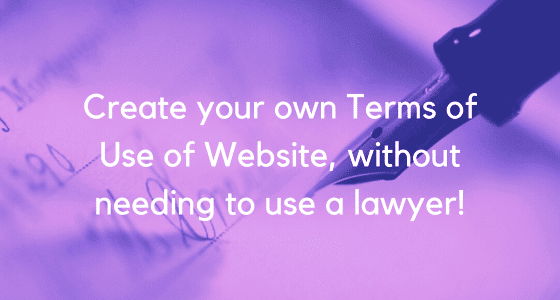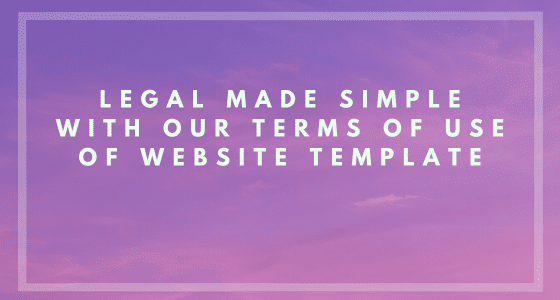Terms of Use of Website
Our Website Terms of Use Template:
- simple to edit and complete
- drafted by a UK expert for reliability
- full guidance notes to assist in editing
- cost-effective legal peace of mind

How Does It Work?
-
1. Download
-
2. Edit
-
3. Print
-
4. Sign
This is our standard website terms of use template – one of our most popular templates. We have designed it for use on any website you operate. So you can customise it to suit your individual requirements.
About our Terms of Use of Website template
This type of website terms of use puts in place a robust and detailed agreement. It is great for a business website or one run as a forum, chat-room or blog, among others. It sets out how visitors and customers are allowed to use and access your site. Also our template includes an “acceptable use” policy, which is very useful for forums and chat-rooms.
The template has been drafted by David, our co-founder and lawyer of twenty years. This ensures that you can rely on the document being up-to-date and legally comprehensive. Our detailed guidance notes (free with the template) offer a clause-by-clause explanation of the agreement and make completing the final document simple and fast. A copy of the guidance notes are available here: guide to this terms of use of website template.
If you only have a very basic website that is not e-commerce, nor does it allow users to post on it, you could instead use our Website Disclaimer, but most sites will benefit more from these Terms of Use of Website.

Using Our Terms of Use of Website template
Once bought, you can download this template for website terms of use at the click of a button. It will be in Word format and you can then edit it easily to fit your needs.
We are confident you will be very happy with your template document, but, in case you are not for any reason, we provide a full money-back guarantee for your peace of mind.
You can reuse the template as many times as you want for creating terms of use for other websites that you operate at no further cost. We review our templates regularly to ensure they stay up-to-date. When we update a template that you have bought, we will notify you by email and you will get a free up-to-date template.
Other e-commerce templates you may need
If you sell via the Internet, then, in addition to terms of use of the website, you may also need:
- our template privacy policy; and
- a template for terms and conditions of sale.
When you need all of these templates, you may like our discounted bundle for website compliance, which contains all of these and more with a nice saving.
If you would like to see our other e-commerce and internet templates, click on the link.

FAQs about Terms of use of Website
Below, we have tackled the top questions on the Internet about this topic.
Are website terms of use a contract?
Yes, website terms of use are typically considered legal contracts because when users access a website it is implied that their continued use of the website is subject to those terms. The terms must be freely accessible by users. So by their using the website, they are entering into a contractual agreement with the website owner.
How do I find the terms and conditions of my website?
Terms and conditions of a website can often be found in the footer under a link titled “Terms of Use”, “Terms” or “Terms and Conditions”. There is also usually a link to them at the checkout stage when making a purchase.
Do I need terms and conditions on my website in the UK? Are terms and conditions legally required for a website?
If you operate as an online shop, then terms and conditions are legally required in the UK. So set out your terms and conditions on your website to ensure that:
- all user rights and responsibilities are made clear, and
- to protect your business.
Your terms and conditions must be compliant with all relevant laws and must be easily accessible on your site.
What legally needs to be on a website in the UK?
In the UK, a website must include the following:
- Contact information, with clear identification of the site owner or company and an email address.
- A privacy policy in which information on how date is collected, used and protected is disclosed.
- A cookies notice in which users are made aware of cookie usage and asked to consent to this.
- Accessibility requirements that comply with the Equality Act 2010 to ensure the website is accessible to all users
- For e-commerce sites, terms and conditions.
It is advisable to also include terms of use, although this is not a legal requirement in the UK.
Can you write your own terms and conditions?
Yes, you can write your own terms and conditions, but it is advisable to do so in a way that ensures everything is up to standard and professional. You can do this using a solicitor, or using a template from a reputable site such as Legalo, in which our solicitors have drafted all of the important details. This way you can ensure that you are complying with all relevant UK laws and that your terms and conditions will protect your interests. Using a Legalo template ensures a high quality result but saves you a significant amount of money.
How do you create terms of use for a website?
Terms of use on your website should include:
- a clear and concise introduction;
- information on user responsibility and prohibited actions;
- details of intellectual property rights;
- disclaimers; and
- limitations of liability.
Terms of use provide website owners with protection and website users with clarification on their rights and responsibilities. To make sure that you protect your rights and property, it is essential to cover areas like usage, privacy, disclaimers, and dispute resolution.
What happens if a website doesn’t have terms and conditions?
Creating a website without terms of use can leave you open to several risks, as users are not subject to clear and concise restrictions. Users could then exploit content and any resulting disputes would lack resolution guidelines. Additionally, there may be challenges in protecting intellectual property, and potential liability issues. All of these outcomes are reasons as to why, even though it is not a legal requirement, we strongly advise you to include terms of use on your website.
Can I copy terms and conditions from another website in the UK?
This can lead to all manner of problems for you. Copying terms and conditions from another website in the UK is not advisable for many reasons:
- You should tailor these documents to your website’s specific needs and practices.
- Using someone else’s terms may not cover your unique circumstances, potentially leading to legal issues.
- It is a breach of copyright to steal someone else’s terms.
- Their terms might not comply with UK laws – they might already have taken them from a website in a different country.
- Finally, their terms might not have been drafted either (a) by a UK solicitor or (b) from a great UK template like Legalo’s.
Since you can make significant cost savings if you use a Legalo template, is it really worth risking all the above problems?
What are terms and conditions examples?
Examples of common terms and conditions clauses include:
- Intellectual Property: Explains ownership of content and user-generated content, and that users must not copy wording or images from the website, as they are copyright to the website owner.
- Liability Limitation / Disclaimer: Limits the website owner’s liability for certain issues, e.g for out-of-date information.
- User Responsibilities: Defines user obligations and prohibited actions.
- Dispute Resolution: Outlines the process for handling disputes.
- Termination: States conditions for account or service termination.
- Privacy: Links to the privacy policy.
- Updates: Explains how and when the terms may change.
Is a website disclaimer the same as terms and conditions?
No, a website disclaimer is not the same as terms and conditions. Terms and conditions are a comprehensive contract governing a user’s order from an e-commerce website, covering various aspects, including the cooling-off period and cancellation rights, refunds, liability, and the privacy policy. They often include a disclaimer. Terms of use of a website should be regarded as part of that contract, but are often written separately and cover various aspects like user responsibilities, liability, intellectual property, etc regarding the user’s access to the website and what they can and cannot do. A disclaimer, on the other hand, is a statement to limit a website owner’s liability for specific issues, such as the accuracy of information or user actions. So the disclaimer usually forms part of the terms of use or terms and conditions.
How do I create a privacy policy for my website?
To create a privacy policy for your website, start with Legalo’s great template, then:
- Identify the data you collect and explain why you collect it;
- Outline how you use, store, and protect the data;
- Clarify user rights regarding their data;
- Describe cookie usage;
- Address compliance with relevant regulations (e.g., GDPR); and
- Specify contact information for data-related inquiries.
It is important that you regularly review and update the policy. Also it is important to ensure you have registered your organisation for the use of data with the ICO.



